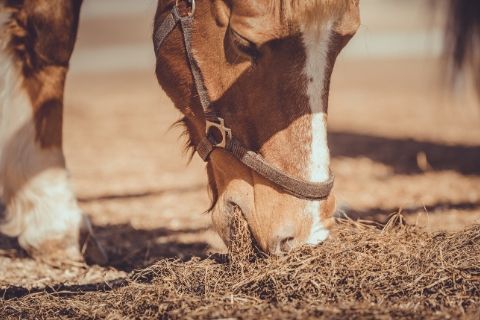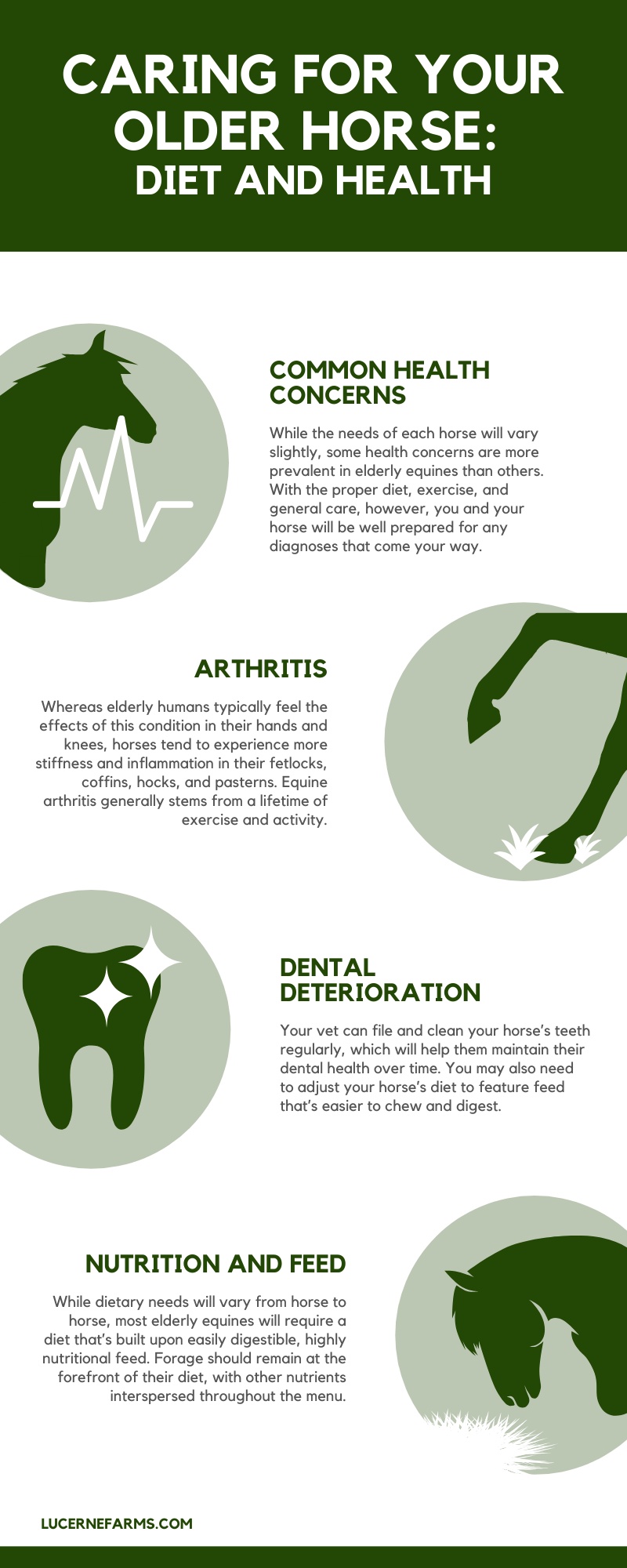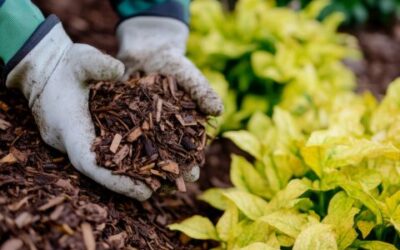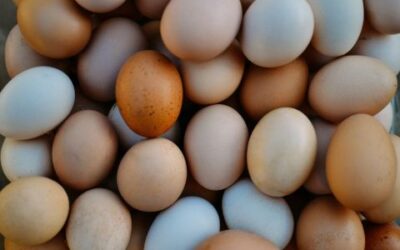
It’s long been said that age is just a number. In general, this sentiment does ring true, and many things seem to improve with age (a little wine and cheese, anyone?). However, there are some special accommodations one must make as the years go by. Just as many elderly humans prepare for their golden years by taking up golf, elderly horses must also prepare for the changes the coming years will bring. According to many veterinarians, many horses are considered senior citizens once they reach 20 years of age, but some will still maintain the energy of a foal well into their old age. This guide to caring for your older horse will ensure that your four-legged friend ages with grace and comfort.
Common Health Concerns
Growing older is no easy task, especially when it’s accompanied by new dietary changes and health restrictions. While the needs of each horse will vary slightly, some health concerns are more prevalent in elderly equines than others. With the proper diet, exercise, and general care, however, you and your horse will be well prepared for any diagnoses that come your way.
Arthritis
Arthritis is one of the most common health concerns for seniors of all species. Whereas elderly humans typically feel the effects of this condition in their hands and knees, horses tend to experience more stiffness and inflammation in their fetlocks, coffin bones, hocks, and pasterns. Equine arthritis generally stems from a lifetime of exercise and activity. The symptoms may be quite subtle at times, so keep an eye out for even the most minor changes in your horse’s behavior. One of the most noticeable signs of arthritis is a reluctance to lie down. This may seem contradictory, as many elderly animals prefer to do nothing but relax all day, humans included. Elderly horses with arthritis are reluctant to do so, however, as it is much more difficult to lie down and stand back up again.
While there is no concrete cure for arthritis just yet, there are some measures you can take to help make your horse more comfortable. Start by adjusting the way you trim or shoe your horse, as this may reduce some of the pressure in their coffin bones and pasterns. You must also ensure that your horse maintains a healthy weight. Added weight will put additional pressure on the joints, which can worsen your horse’s arthritis. Adjust your horse’s diet and ensure that they’re provided ample exercise in order to keep them at a healthy weight.
Dental Deterioration
Dental deterioration is as much a concern for horses as it is for humans. Maintaining your horse’s pearly whites is far more practical than it is cosmetic. Horses chew in a circular motion, though perhaps not quite as exaggerated as old cartoons make it out to be. This circular motion wears away at the horse’s teeth, leaving them with sharply pointed molars over time. These sharp points and hooked molars can severely impact your horse’s diet. Your vet will float your horse’s teeth regularly, which will help them maintain their dental health. You may also need to adjust your horse’s diet to feature feed that’s easier to chew and digest.
Nutrition and Feed
And now it’s time to get into my favorite topic: food! One of the biggest changes you and your horse will face as they age is adjusting to a new diet and feeding schedule. As you begin to craft a new menu for your horse, consider any additional health conditions that may affect their ability to eat and digest feed. Consult your veterinarian before making any drastic changes to your horse’s diet, as they will be able to provide the most accurate recommendations regarding necessary nutrients for your horse’s individual needs. While dietary needs will vary from horse to horse, most elderly equines will require a diet that’s built upon easily digestible, highly nutritional feed. Forage should remain at the forefront of their diet, with other nutrients interspersed throughout the menu.
It’s recommended that horses eat a minimum of 1.5 percent of their body weight in forage every day. Choosing the best forage for your horse often comes down to nutritional value. As elderly horses have a harder time absorbing nutrients, it’s important that you give your horse a leg up and choose the most nutritional feed and forage possible. Chopped alfalfa hay is one of the best forage options for elderly horses. Alfalfa hay is rich in protein, fats, fiber, calcium, and phosphorus, all of which are necessary nutrients that will help your horse maintain a healthy weight for many years to come. Chopped alfalfa hay can also be wetted down for horses with dental troubles.
While forage will comprise the bulk of your horse’s diet, it may be necessary to supplement your senior horse’s feed with additional nutrients as well. Vitamin C supplements are particularly beneficial because they can help improve senior horses’ immune system. When adding supplements to your horse’s diet, do not tip the scale too far one way or the other. Take special care that the vitamins or minerals do not contradict any other aspects of your horse’s nutrition, and be sure to consult your veterinarian before making any drastic changes.
The most important thing to bear in mind when adjusting your senior horse’s diet is that what works for one horse may not work for another. Build your horse or pony a diet that matches their individual needs and health conditions. And remember, it’s okay to cheat on your diet every once in a while, so be sure to keep a few carrots and apples on hand for special occasions.
Every senior horse will age in its own way and at its own pace. Familiarizing yourself with some of the more common health conditions for senior horses will help you prepare for potential changes in your horse’s needs. However, as important as it is to be aware of such conditions, it’s even more important to be aware of your horse’s individual needs. Whether your horse experiences some, all, or none of the above listed conditions will depend on a variety of different factors. Pay close attention to changes in your horse’s mood and behaviors and speak with your veterinarian to make the necessary changes that will be best for your horse’s individual needs. And who knows? With the proper preparations, your senior horse may remain spry as a foal well into their golden years.





